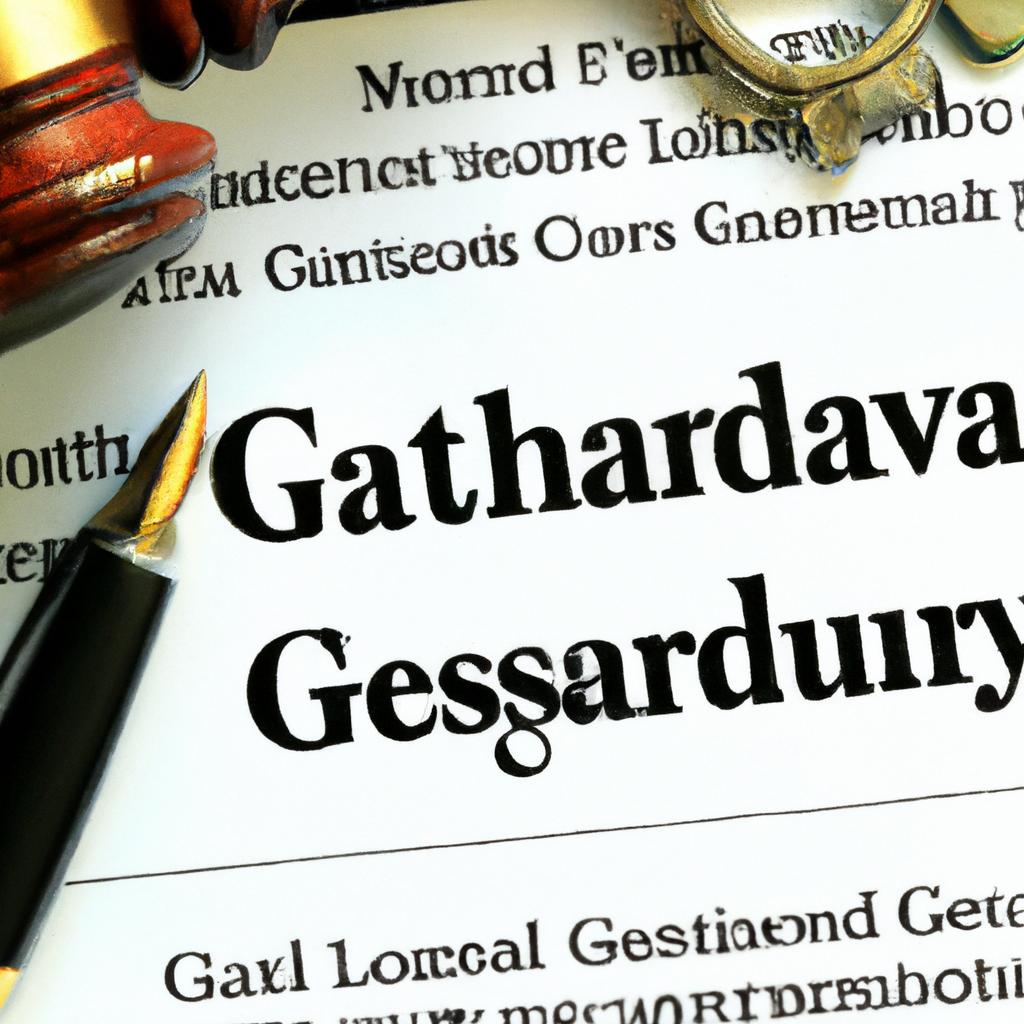In the intricate world of estate planning and legal guardianship, the concept of estate guardianship looms as a crucial aspect to ensure the protection and preservation of an individual’s assets. At Morgan Legal Group in New York City, we specialize in navigating the complexities of estate planning, probate, elder law, Wills, and trusts, offering expert guidance and advocacy for clients seeking to establish and uphold their estate guardianship arrangements. In this article, we delve into the nuanced intricacies of estate guardianship, shedding light on its significance and implications in safeguarding one’s financial and personal interests.
Understanding the Role of an Estate Guardian in Safeguarding Assets
An estate guardian plays a crucial role in safeguarding assets and ensuring the wishes of the estate owner are carried out effectively. They are appointed by the court to protect the interests of the estate, including managing assets, making financial decisions, and representing the estate in legal matters. The responsibilities of an estate guardian are extensive and require a high level of trust, professionalism, and expertise.
When it comes to estate guardianship, it is essential to understand the key duties and obligations that come with the role. Some of the important responsibilities of an estate guardian include:
- Asset Management: Ensuring the proper management and protection of assets belonging to the estate.
- Financial Decision-Making: Making sound financial decisions on behalf of the estate, including investments, expenses, and distributions.
- Legal Representation: Representing the estate in legal proceedings, including probate, disputes, and negotiations.

Key Considerations When Choosing an Estate Guardian
When selecting an estate guardian, it is crucial to thoroughly evaluate potential candidates to ensure they are capable of managing your affairs responsibly and ethically. Here are some key considerations to keep in mind:
- Trustworthiness: It is essential to choose a guardian who is trustworthy and has a proven track record of integrity.
- Financial Responsibility: Look for someone who is financially responsible and has experience managing financial matters.
- Availability: Ensure that the guardian has the time and availability to take on the responsibilities of managing your estate.
- Legal Knowledge: Consider selecting a guardian who has a good understanding of estate planning laws and regulations.
Ultimately, selecting an estate guardian is a significant decision that requires careful consideration. By keeping these key considerations in mind, you can choose a guardian who will effectively manage your affairs and ensure that your wishes are carried out according to your estate plan.

Navigating the Legal Process of Establishing Estate Guardianship
Establishing estate guardianship can be a complex and intricate legal process that requires careful attention to detail and adherence to specific guidelines. As experienced estate planning attorneys, we understand the importance of ensuring that your loved one’s wishes and best interests are upheld during this process. Our team at Morgan Legal Group in New York City is here to guide you through the legal steps involved in establishing estate guardianship.
When , it is crucial to consider the following key factors:
- Choosing the Right Guardian: Selecting a guardian who is trustworthy, responsible, and capable of making important decisions on behalf of the estate is essential.
- Court Petition: Filing a court petition to appoint a guardian for the estate is a necessary step in the process. Providing evidence and documentation to support the need for guardianship is crucial in gaining approval from the court.

Ensuring Comprehensive Planning and Oversight in Estate Guardianship Arrangements
When it comes to estate guardianship arrangements, ensuring comprehensive planning and oversight is essential to protect the interests of the individual under guardianship. At Morgan Legal Group, we understand the importance of creating a detailed plan that covers every aspect of the individual’s estate and well-being. Our team of experienced attorneys works closely with clients to develop personalized guardianship arrangements that address their unique needs and circumstances.
By implementing thorough oversight measures, we strive to prevent any potential misuse or abuse of authority by the appointed guardian. This includes regular monitoring of the guardian’s actions, financial transactions, and decision-making processes. Our goal is to provide peace of mind to both the individual under guardianship and their loved ones, knowing that their best interests are always protected.
Q&A
Q: What is estate guardianship?
A: Estate guardianship is a legal arrangement in which a person, often referred to as a guardian, is appointed to manage the financial affairs of an individual who is unable to do so themselves due to incapacity.
Q: How is estate guardianship different from other types of guardianship?
A: Estate guardianship specifically pertains to the management of an individual’s finances and assets, whereas other types of guardianship may involve making decisions about a person’s healthcare or living arrangements.
Q: How is a guardian chosen for estate guardianship?
A: A guardian for estate guardianship is typically chosen by a judge, who will consider factors such as the individual’s relationships and financial expertise.
Q: What kind of responsibilities does an estate guardian have?
A: An estate guardian is responsible for managing the individual’s finances, paying bills, making investments, and ensuring that the individual’s assets are properly protected.
Q: How long does estate guardianship typically last?
A: Estate guardianship can last for an indefinite period of time, and may end if the individual regains the capacity to manage their own finances or passes away.
Q: What are some potential drawbacks of estate guardianship?
A: Some potential drawbacks of estate guardianship include the loss of autonomy for the individual, the possibility of financial mismanagement by the guardian, and the costs associated with legal fees and court proceedings.
Q: Can estate guardianship be contested?
A: Yes, estate guardianship can be contested by family members or other interested parties if they believe that the guardian is not acting in the best interests of the individual.
To Wrap It Up
In conclusion, estate guardianship can be a complex and sensitive issue that requires careful consideration and planning. By understanding the responsibilities and duties involved, individuals can ensure that their affairs are properly managed and their best interests are protected. Whether acting as a guardian or seeking guardianship for a loved one, it is important to seek legal guidance and support to navigate this important aspect of estate planning. Remember, estate guardianship is not just about managing assets, but about providing care, protection, and advocacy for those who may be unable to make decisions for themselves. By approaching this process with compassion and diligence, we can uphold the dignity and rights of individuals in need of support. Thank you for reading.
 Estate guardianship is a legal proceeding in which a guardian is appointed to manage the affairs of a person who has become incapacitated or unable to manage their own estate. This can happen due to a variety of reasons, such as old age, illness, or disability. In such situations, it becomes necessary to have a trusted individual or institution act as a guardian to make important decisions and handle financial matters on behalf of the incapacitated person.
Estate guardianship is a legal proceeding in which a guardian is appointed to manage the affairs of a person who has become incapacitated or unable to manage their own estate. This can happen due to a variety of reasons, such as old age, illness, or disability. In such situations, it becomes necessary to have a trusted individual or institution act as a guardian to make important decisions and handle financial matters on behalf of the incapacitated person.
The main purpose of estate guardianship is to protect the interests of an incapacitated individual, ensuring that their assets and estate are properly managed and used for their benefit. The process of appointing a guardian is overseen by the court and involves a thorough evaluation of the individual’s mental and physical capacity. It is essential to understand the importance of estate guardianship and how it can benefit both the incapacitated person and their loved ones.
The Role of a Guardian
A guardian is a person or entity who is legally appointed by the court to make decisions on behalf of the incapacitated person. They have a fiduciary duty, which means they are legally bound to act in the best interests of the incapacitated person and make decisions that benefit them. The role of a guardian is multifaceted and can include managing finances, making healthcare decisions, arranging for daily care, and handling legal affairs. The specific duties of a guardian will vary depending on the needs and circumstances of the incapacitated person.
Types of Guardianship
There are two types of guardianship, each with its own purpose and scope of authority. The first type is known as a guardianship of the person, which gives the guardian the authority to make decisions concerning the personal care and well-being of an incapacitated individual. This can include decisions related to their housing, healthcare, and daily living arrangements. The second type is known as a guardianship of the estate, which gives the guardian the authority to manage the financial affairs and assets of an incapacitated person.
Benefits of Estate Guardianship
Estate guardianship provides many benefits to both the incapacitated person and their loved ones. Here are some of the most notable ones:
1. Protection of assets: One of the primary benefits of estate guardianship is the protection of the incapacitated person’s assets. By appointing a guardian, the court ensures that the individual’s assets are not misused or diminished due to poor decision-making or exploitation.
2. Assured care and well-being: With a guardian in place, the incapacitated person can be assured of proper care and support. The guardian is responsible for arranging appropriate housing, healthcare, and daily living arrangements, ensuring the individual’s needs are met.
3. Peace of mind for loved ones: Estate guardianship can bring peace of mind to family members and loved ones of the incapacitated person, knowing that their loved one’s affairs are being managed diligently by a trusted guardian.
4. Legal protection: Estate guardianship provides legal protection to the incapacitated person and their estate. The appointed guardian is accountable to the court and can be held liable for any wrongdoing or negligence, ensuring the proper management of the individual’s assets and affairs.
The Process of Estate Guardianship
The process of obtaining estate guardianship involves several steps that must be followed carefully to ensure the individual’s best interests are protected.
1. Filing a petition: The first step is filing a petition with the court to request a guardianship. The petitioner is usually a family member or close relative who is concerned about the well-being of the incapacitated person.
2. Evaluation and hearing: The court will then evaluate the petition and may conduct a hearing to determine the individual’s capacity and assess the need for a guardianship.
3. Appointment of a guardian: If it is determined that the individual is incapacitated and requires a guardian, the court will appoint a suitable person or institution to act as the guardian.
4. Annual accounting: The guardian is required to submit an annual accounting to the court, detailing the management of the individual’s finances. This ensures transparency and accountability.
Practical Tips for Estate Guardians
If you are considering becoming an estate guardian, here are some practical tips to keep in mind:
1. Seek legal advice: Guardianship is a complex legal process, and it is crucial to seek legal advice from an experienced attorney to understand the legal implications and responsibilities involved.
2. Build a support system: Being a guardian can be emotionally and mentally demanding, and it is essential to build a support system of family, friends, and professionals who can provide guidance and assistance when needed.
3. Communicate with the incapacitated person: It is important to maintain open communication with the incapacitated person as much as possible and involve them in decision-making whenever possible.
Conclusion
In conclusion, estate guardianship is a critical legal process that ensures the well-being and protection of an incapacitated person and their assets. It provides peace of mind to family members while also protecting the incapacitated person’s interests and estate. If you are considering estate guardianship, it is essential to seek legal advice and consult with the individual’s loved ones to ensure the best possible outcome for all parties involved.

